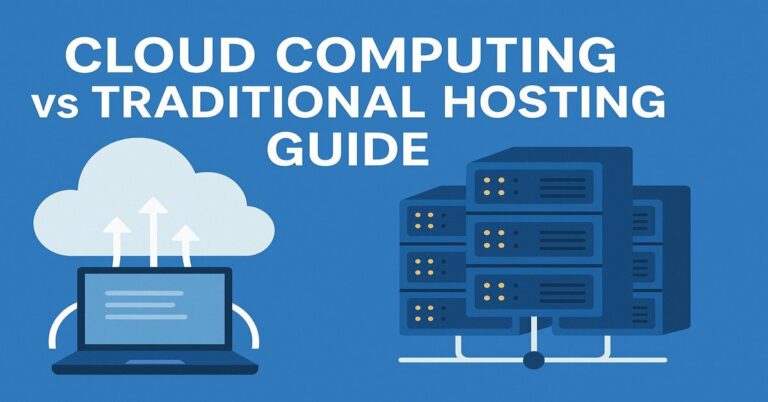In today’s fast-paced digital world, your website’s hosting can be the silent force behind its success—or failure. Whether you are launching a blog, a business site, or an eCommerce store, one major decision you must make early on is choosing between Cloud Computing vs Traditional Hosting.
In this detailed guide, we will explain what each option offers, compare their pros and cons, and help you decide which solution is best for your goals in 2025 and beyond.
What is Traditional Hosting?
Traditional hosting refers to web hosting services that operate on a single physical server. Your website is hosted on a particular machine that stores all your files, databases, and configurations. The types of traditional hosting include:
- Shared Hosting – multiple websites share one server.
- VPS (Virtual Private Server) – a virtualized portion of a physical server.
- Dedicated Hosting – the entire server is dedicated to your website.
These hosting options are offered by popular providers like Bluehost, HostGator, GoDaddy, and many others.
What is Cloud Hosting?
Cloud hosting is a modern approach where your website is hosted on multiple connected servers working together as a network. Instead of relying on a single physical machine, cloud hosting uses virtual machines spread across data centers, delivering better performance, scalability, and uptime.
Popular cloud hosting providers include:
- Amazon Web Services (AWS)
- Google Cloud Platform (GCP)
- Microsoft Azure
- DigitalOcean
- Cloudways
Major Differences: Cloud Computing vs Traditional Hosting
| Feature | Traditional Hosting | Cloud Hosting |
| Infrastructure | Single physical server | Network of virtual servers (cloud) |
| Scalability | Limited and manual | Instant and automatic |
| Uptime | Dependent on one server | High redundancy, minimal downtime |
| Performance | Affected by traffic spikes | Load balanced across multiple servers |
| Pricing Model | Fixed monthly/yearly pricing | Pay-as-you-use (flexible billing) |
| Security | Limited protections, depends on provider | Advanced encryption, DDoS protection |
| Customization | Some control (esp. with VPS/Dedicated) | High customization with APIs |
| Maintenance | User or provider handles updates | Automatic, managed by cloud vendor |
Advantages of Cloud Hosting in 2025
Cloud hosting is no longer just a trend—it has become the backbone of modern internet infrastructure. Let’s look at why:
1. Auto-Scalability
Cloud hosting adapts in real-time. When your traffic spikes suddenly, the system automatically scales up resources—no need for manual upgrades.
2. High Uptime
Thanks to redundancy, your website will always be online. If one server fails, another instantly takes over. This means uptime above 99.99%.
3. Faster Website Speed
Cloud servers distribute the load evenly, ensuring fast loading times—even during peak hours.
4. Global Reach
Many cloud platforms include built-in Content Delivery Networks that cache your site globally, speeding it up worldwide. These CDNs help reduce latency by storing copies of your website closer to users. With modern demand for instant access, CDNs are now considered essential for performance.
5. Advanced Security
Cloud hosting platforms offer:
- 256-bit encryption
- Firewalls
- Automated patching
- Malware scanning
- DDoS protection
6. Disaster Recovery & Backup
Most cloud hosts offer real-time backups and easy restore options, minimizing data loss risk.
7. Environment Friendly
Because cloud servers are shared efficiently, they use less energy than traditional physical servers, making them more sustainable.
When to Choose Traditional Hosting
Despite the cloud revolution, traditional hosting still holds value in some scenarios:
1. Low-Traffic Websites
If you’re launching a simple personal blog or portfolio, traditional shared hosting can be enough.
2. Fixed Budget
Traditional hosting often comes with predictable monthly costs, which may suit small projects.
3. Control Over Server
With VPS or dedicated servers, you get root access, full control over software installs, and OS configurations.
4. Ease of Setup
Many traditional hosting platforms come with cPanel and 1-click install tools for WordPress, Joomla, etc.
Performance Showdown: Cloud vs Traditional
| Metric | Winner |
| Page Load Speed | Cloud Hosting |
| Server Response | Cloud Hosting |
| Traffic Handling | Cloud Hosting |
| Setup Simplicity | Traditional Hosting |
| Price (Basic) | Traditional (Shared) |
| Price (Advanced) | Cloud (value per usage) |
If speed, uptime, and growth matter to you — cloud hosting wins every time.
Hosting Cost Comparison in 2025
| Plan Type | Traditional Hosting | Cloud Hosting |
| Shared | $2 – $5/month | Not applicable |
| VPS | $10 – $40/month | $10 – $30/month |
| Dedicated | $100 – $500/month | Not available (virtual model) |
| Cloud Basic | N/A | $5 – $20/month (usage-based) |
| Cloud Scalable | N/A | $50 – $200/month (auto-scalable) |
Note: Cloud hosting can seem costlier, but its value lies in uptime, scalability, and reliability.
Security Factors in 2025
Security is more important than ever in 2025. Let’s compare:
| Feature | Traditional Hosting | Cloud Hosting |
| DDoS Protection | Basic (only on premium plans) | Advanced, AI-driven |
| SSL Support | Available (sometimes paid) | Included in most packages |
| Backup | Weekly or manual | Real-time, automatic |
| Threat Detection | Limited | Integrated AI-based scanning |
Cloud hosting platforms are clearly ahead in protecting sensitive data and uptime. Providers like AWS and Google Cloud integrate automated patching, malware scanning, firewalls, and real-time DDoS protection to ensure your website remains secure even under malicious attacks.
Real-World Use Cases
Use Cloud Hosting For:
- High-traffic blogs & eCommerce stores
- SaaS applications
- Video streaming platforms
- International business websites
Use Traditional Hosting For:
- Static websites
- Student portfolios
- Temporary campaigns or landing pages
- Beginners learning web development
Expert Tips Before Choosing
- Check Your Website’s Future Needs – Will traffic grow?
- Set a Budget – Pay-as-you-go is better for uncertain traffic.
- Prioritize Speed & Uptime – Especially for commercial sites.
- Don’t Ignore Support – Choose a host with 24/7 expert support.
- Avoid Overbuying – Start with scalable plans instead of expensive dedicated servers.
Final Verdict: Which is Best in 2025?
For most businesses and developers, cloud hosting is the smarter long-term investment in 2025. It offers unmatched flexibility, security, and performance. However, traditional hosting still works for small, simple, and budget-friendly projects. When evaluating Cloud Computing vs Traditional Hosting, it’s clear that the choice depends on your website’s goals, growth expectations, and technical requirements.
FAQs
Yes. It’s faster, more reliable, and scalable.
Absolutely. Many cloud hosts offer WordPress-optimized plans.
Yes. Most cloud providers offer easy migration tools or free service.
Yes. Many providers have affordable starter cloud plans.
📖 Read more: Best AI Tools for Content Creators in 2025
👉 Also read: What is 5G Technology and How Does It Work?

UrbanMatter.com.in is a guest post platform where writers share insights on tech, lifestyle, business, and more to inform and engage readers.

